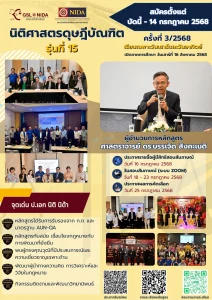Doctor of Laws Program
- The course is certified by and accredited by the Judicial Commission and the State Attorney Commission
- The course is accredited by AUN-QA (Asean University Network Quality Assurance).
- We offer two tracks: 1) Dissertation Track and2) Coursework and Dissertation Track.
- Classes are held on Saturdays and Sundays.
- The total cost of the course is approximately 530,000 baht.
- Applications for the 15th batch are open until July 14, 2025
About the Program
Title of Degree and Program
Doctor of Laws (LL.D.)
Program Philosophy
The program aims to produce doctoral graduates with a body of legal knowledge, morality, ethics, good governance and proficiency in law. These graduates are well-rounded and capable of thinking, analyzing, determining the law, and apply it in accordance with the rule of law to uphold social justice and to secure national interests as well as to intellectually contribute to national development.
Objectives
- To produce doctoral graduates with a body of legal knowledge and academic excellence in law
- To produce researchers in the field of law who are capable of applying their body of knowledge with development administration and creating high-quality research works that contribute to national development and uphold social justice
- To produce and develop lawyers including professionals in law-related careers who have a code of conduct, a body of knowledge, a code of ethics, and good governance
- To expand doctorate-level education and research opportunities as well as academic service in advanced law to the country
Potential Professions of Law Graduates
- University lecturers
- Researchers and academics in law
- Judges, arbiters, prosecutors, soldiers, police
- Legal officers, lawyers, legal counsels
- Other freelance jobs
Course Management System
It is a bi-semester system. One academic year has two semesters, each lasting 15 weeks at the minimum. The program might cover a summer semester whose period and credits can be comparable to those in any regular semester.
Program Structure
| Subject Group | Track 1 (1.1) | Track 2 (2.1) |
| (1) Pre-Foundation sessions | 0-15 credits (Non-credits) | 6 credits (Non-credits) |
| (2) Core courses | Possibility for auditing a class without credits | 9 credits |
| (3) Research courses | Possibility for auditing a class without credits | 6 credits |
| (4) Dissertation | 48 credits | 36 credits |
| (5) Qualifying examination | Exam (required to pass within 2 academic years) | Exam ((upon completion of all courseworks with GPA of no less than 3.0) |
| Total | 48 credits | 51 credits |
Expected Learning Outcomes (ELO)
| Expected Learning Outcomes | Generic ELOs | Specific ELOs | |
| ELO 1 | Assess the role and function of law for development administration and provide legal viewpoints and solutions for related problems | x | |
| ELO 2 | Analyze legal issues by applying and relating to other sciences and the physical elements of law such as political science, politics, economy for development | x | |
| ELO 3 | Communicate with effective spoken and written language | x | |
| ELO 4 | Presenting legal arguments and legal logic with principles and reasons | x | |
| ELO 5 | Collaborate effectively with others in a variety of environments | x | |
| ELO 6 | Analyze and apply the law with an awareness of increasing social justice and development | x | |
Qualifications of Applicants
Track 1 (1.1) - Dissertation Track
- Holding a Master of Laws degree (LL.M.) from any educational institution accredited by the Office of the Higher Education Commission (OHEC).
- Having the minimum required score of one of the English proficiency tests as follows:
(1) TOEFL score of 500 (paper-based) or 173 (computer-based), or 61 (internet-based - IBT);
(2) IELTS score of 5.5. All test results must be valid (not older than two years) on the date of the application. (Applicants with a TOEFL score below 500 or other equivalent test score are allowed by NIDA to apply.)
*If the applicants with a TOEFL score between 450 – 549 are accepted for admission, they are required to enroll in the English Pre-Foundation Course. - Holding at least 2 letters of reference from the applicant’s undergraduate or graduate lecturers, advisors, and/or supervisors certifying that he/she is qualified to study at the doctoral level.
- Having experience in conducting research of at least 1 piece. (a requirement for applicants in Track 1 (1.1) only)
- Being able to devote time to study as a full-time student who can meet all the program’s requirements for graduation.
Track 2 (2.1) – Coursework and Dissertation Track
- Holding a Master of Laws degree (LL.M.) from any educational institution accredited by the Office of the Higher Education Commission (OHEC).
- Having the minimum required score of one of the English proficiency tests as follows:
(1) TOEFL score of 500 (paper-based) or 173 (computer-based), or 61 (internet-based - IBT);
(2) IELTS score of 5.5. All test results must be valid (not older than two years) on the date of the application. (Applicants with a TOEFL score below 500 or other equivalent test score are allowed by NIDA to apply.)
*If the applicants with a TOEFL score between 450 – 549 are accepted for admission, they are required to enroll in the English Pre-Foundation Course. - Being able to devote time to study as a full-time student who can meet all the program’s requirements for graduation.
Selection of Students
Track 1 (1.1) - Dissertation Track
- Preliminary Examination considerations include:
- Application
- TOEFL or IELTS scores
- A qualitative research paper in the field of law (participation or individual work)
- Preliminary thesis outline, submitted to the student selection committee alongside the application
- Interview conducted by the student selection committee
Track 2 (2.1) – Coursework and Dissertation Track
- Preliminary Examination considerations include:
- Application
- TOEFL or IELTS scores
- Academic work in the field of law, such as an article (optional)
- Preliminary thesis outline, submitted to the student selection committee alongside the application
- Interview conducted by the student selection committee
Course
Track 1 (1.1) - Dissertation Track
- LD 4000 Foreign Language Preparation for Legal Research
- LD 4001 Preparatory Course for Studying Advanced Law and Development
- LD 4002 Preparatory Course for Advanced Legal Research Skills
- LD 9900 Dissertation (Track 1 (1.1))
Track 2 (2.1) – Coursework and Dissertation Track
- LD 6000 Foreign Language for Legal Research
- LD 6001 Advanced Law and Development
- LD 6002 Seminar on Advanced Legal Problems
- LD 8100 Advanced Legal Research Methodology 1
- LD 8101 Advanced Legal Research Methodology 2
- LD 9901 Dissertation (Track 2 (2.1))
Scholarship
Research Funding:
The objective is to support thesis work. This funding is divided based on the source of funds into:
- Research funding from the institution's budget
- Research funding from the Government budget
Interested students can apply for scholarships by submitting your application along with supporting evidence to the Public Relations Department of Graduate School of Law, 5th Floor, Boonchana Atthakorn Building.







